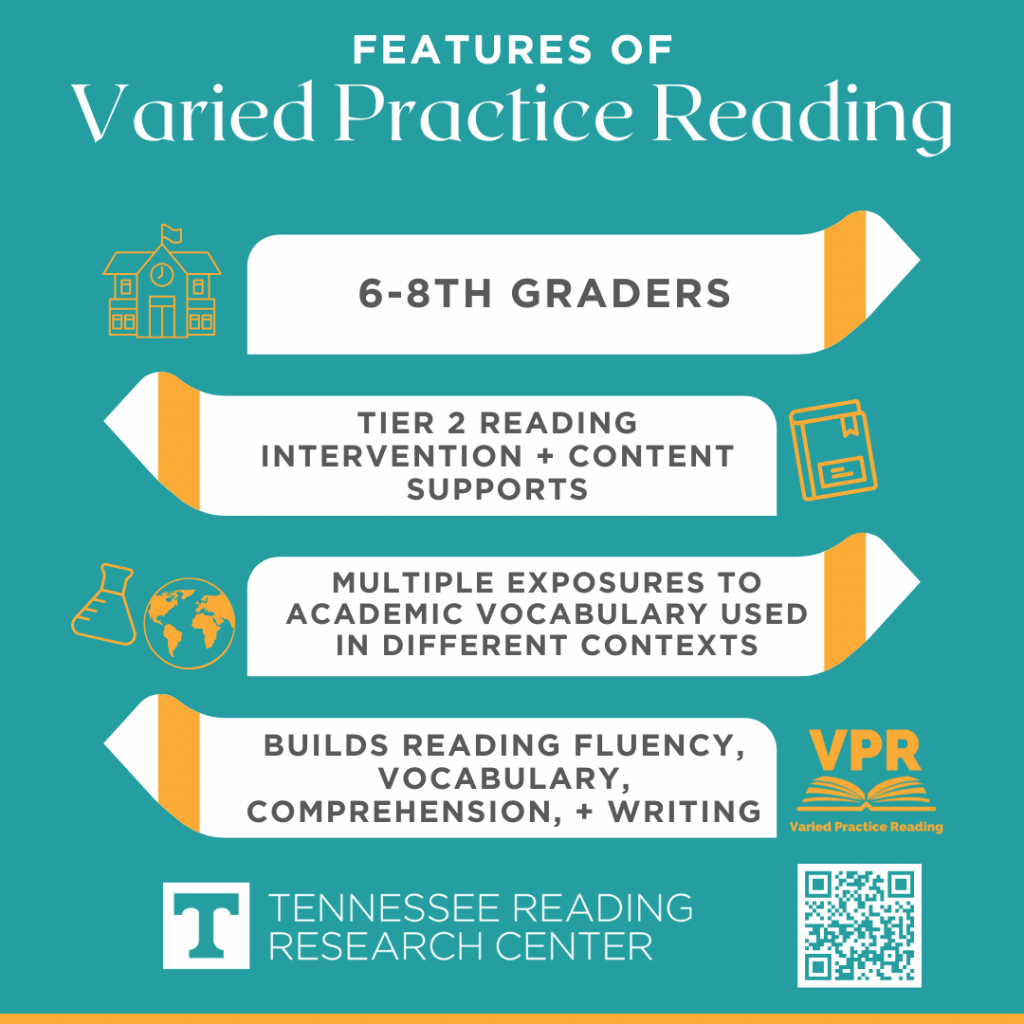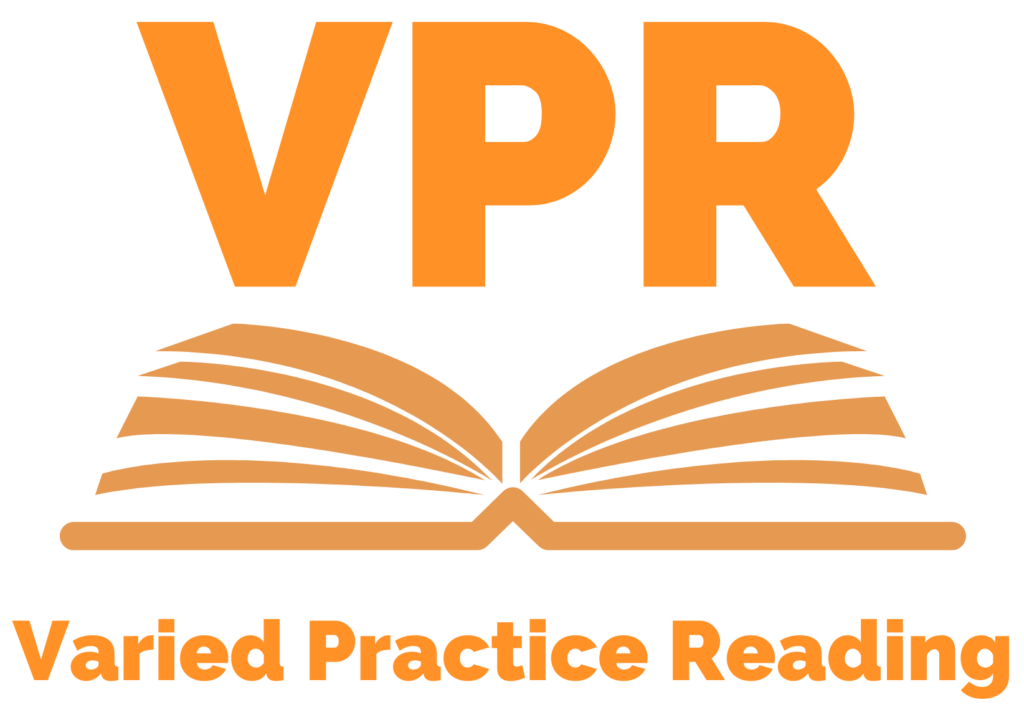Project Details
FUNDING AGENCY
Institute of Education Sciences, U.S. Department of Education, Grant #R324A220269
- Additional information on the IES website
UTK RESEARCHERS
Deborah K. Reed, Ph.D. (Principal Investigator)
Emily Beyer, (Project Manager)
RATIONALE
Students in Grades 6-8 who are not reading proficiently need both Tier 2 literacy intervention and support for learning in the text-based content areas of science and social studies. Varied Practice Reading (VPR) provides students multiple exposures to critical science and social studies language and information while building students’ reading fluency, vocabulary, and comprehension as well as writing skills.
RESEARCH DESIGN
Tier 2 reading intervention classes will be randomly assigned to either VPR or to the typical reading intervention used at the school. Students will spend one semester completing their assigned reading intervention. Parental consent is required but does not remove students from the class.
TIMELINE AND SAMPLE
- Spring 2021: Grade 7
- Fall 2023: Grades 6 and 8 (minimum of 100 students/grade = 200 students total)
- Fall 2024: Grades 6, 7, and 8 (minimum of 100 students/grade = 300 students total)
VPR DESCRIPTION
- Passage set = four passages on a single topic
- The passages in each set have an 85% word overlap
- 15 passage sets on science topics and 15 sets on social studies topics
- Combination of fictional and informational genre
- Gradual progression in Lexile level from two grade bands below through on-grade-level
- Each set has comprehension questions and writing prompt based on state standards
- Individualized lessons on fluency, vocabulary & comprehension, and writing skills
- Digital delivery of all components
PROJECT DETAILS
Half the intervention time is spent reading the passage set with a partner (Partner A reads passages 1 and 3; Partner B reads passages 2 and 4) and providing each other feedback. Half the intervention time is spent working independently to answer the comprehension questions and writing prompt on the set, then completing a lesson chosen by the teacher.
VPR TEACHER PROCEDURES
Prepare students for the intervention, partner them, monitor their work, and use the data to assign individualized lessons on the computer. Audio record student pairs once per week for the research team to monitor fidelity. Administer the pre/post tests on the computer.
TYPICAL INSTRUCTION TEACHER PROCEDURES
Audio record the class once per week and administer the pre/post tests on the computer.

We would like to thank our partners:
Participating Middle Schools: Gibbs, Vine, Whittle Springs.
Participating Middle Schools: North, South, Huntland.
Preliminary Findings
- Proof of concept study in Grade 7: Pre-to-posttest effects
- Science d = 1.128
- Vocabulary d = 0.721
- Social Studies d = 0.425
- Field test in Grades 6 and 8: Quasi-experimental treatment v. comparison
- Reading comprehension: g = 0.49
- Significant average treatment effect for:
- TCAP Social Studies (Est = 7.3)
- Silent Reading Fluency (Est = 10.7)
- Significant treatment on the treated effect for Silent Reading Fluency (Est = 24.3)
- Social validity
- 80% to 100% of teachers agreed or strongly agreed that the elements and features of VPR were helpful and easy to use
- 55% to 88% of students agreed or strongly agreed that the intervention would help them do better in their core classes (ELA, science, and social studies) and improve their overall reading and writing abilities
- Randomized control trial in Grades 6, 7, and 8 underway
VPR-Related Publications
- Wexler, J., Reed, D.K., & Omohundro, K.M. (2025). The state of adolescent literacy. In S.B. Neuman & M.R. Kuhn (Eds.) Handbook on the science of literacy in grades 3-8, (pp. 223-240). Guilford Publications, Inc.
- Reed, D.K. (2023). Reading intervention in middle schools: Challenges and suggested approaches. Middle School Journal, 54(5), 42-51. https://doi.org/10.1080/00940771.2023.2254176
- Reed, D.K., Binning, K., Jemison, E.A., & DeSalle, N. (2023). High-quality formative writing assessment for middle school students in tier 2 literacy interventions. Learning Disabilities Research & Practice, 38, 70-79. https://doi.org/10.1111/ldrp.12300
- Reed, D.K. (2022). Fluency instruction for adolescents: Evidence from research and practice. Learning Disabilities: A Contemporary Journal, 20, 101-110. https://eric.ed.gov/?id=EJ1359642
VPR-Related Presentations
- Reed, D. K. (2025, October). Meaning-based intervention and knowledge building for adolescents [Panel presentation]. 47th annual Council for Learning Disabilities International Conference, Salt Lake City, UT.
- Reed, D. K. (2025, February). Determining promise when researching interventions in middle schools [Panel presentation]. Pacific Coast Research Conference (PCRC), Coronado Beach, CA.
- Reed, D. K. (2025, February). Building adolescents’ syntactical skills and proficient reading ability [Presentation]. Literacy Mid-South Out-of-School Time Network, Memphis, TN.
- Reed, D. K. (2025, January). Improving the feasibility of delivering reading intervention in middle schools: Digital components of Varied Practice Reading [Technology demonstration; canceled due to weather]. IES Principal Investigators’ Meeting, Washington, DC.
- Reed, D.K. (2024, May). Building adolescents’ syntactical skills and reading fluency [Presentation]. PaTTAN Secondary Literacy Summit, Harrisburg, PA.
- Reed, D. K., Hock, I., & Hock, M. (2024, March). Literacy intervention for adolescents: Integrating reading, content area knowledge, and social-emotional development [pre-conference workshop]. Council for Exceptional Children (CEC) annual convention, San Antonio, TX.
- Gibbs, A.S., Beyer, E., & Reed, D.K. (2023, October). Using varied practice reading with middle school students in tier 2 reading intervention [Panel Presentation]. 2023 TN-CEC Conference, Cookeville, TN.
- Reed, D. K. (2023, October). Scientifically-based reading instruction: Fluency [Panel presentation]. International Dyslexia Association Conference, Columbus, OH.
- Reed, D. K. (2023, October). Varied practice reading: A tier 2 reading intervention [Panel presentation]. International Academy for Research in Learning Disabilities (IARLD) Conference, Gainesville, FL.
- Reed, D. K., Houchins, D., Wexler, J., & Lambert, R. (2023, May). (In)Congruence between rigorous research and secondary school realities: Assessing implementation fidelity [Virtual panel presentation]. FY 2023 Institute of Education Sciences Principal Investigators Meeting.
- Reed, D. K., & Gibbs, A. (2023, March). Barriers to implementing Tier 2 reading intervention in middle schools [Poster session]. Council for Exceptional Children (CEC) annual convention, Louisville, KY.
- Reed, D. K. (2023, March). Missed opportunities: What fidelity data reveal about literacy intervention in middle schools [Paper presentation]. Badar-Kauffman Conference on Contemporary Issues in Special Education Research. Kent, OH.
- Reed, D. K. (2023, February). Advancing the field by extending seminal work on reading and writing CBMs: Oral reading fluency [Panel presentation]. Pacific Coast Research Conference (PCRC), Coronado Beach, CA.
- Reed, D. K. (2022, November). Advances in assessments for students with dyslexia: Fluency progress monitoring [Panel presentation]. IDA 2022 Annual Reading, Literacy & Learning Conference, San Antonio, TX.


